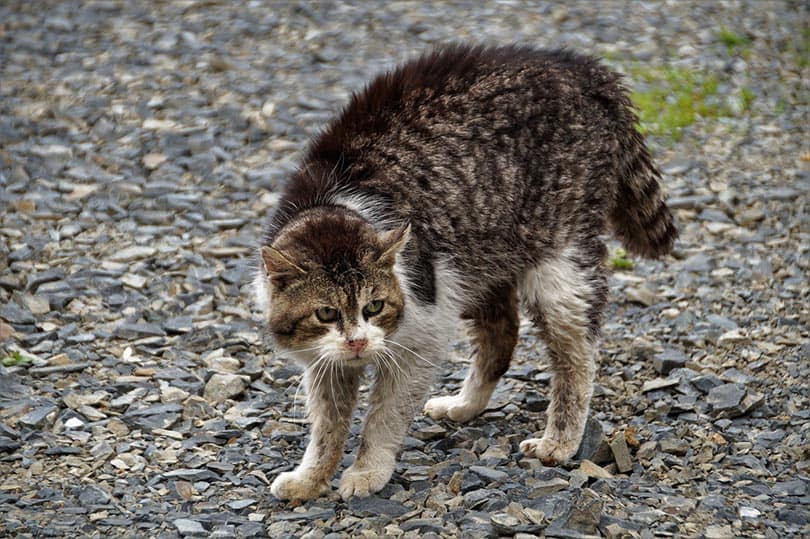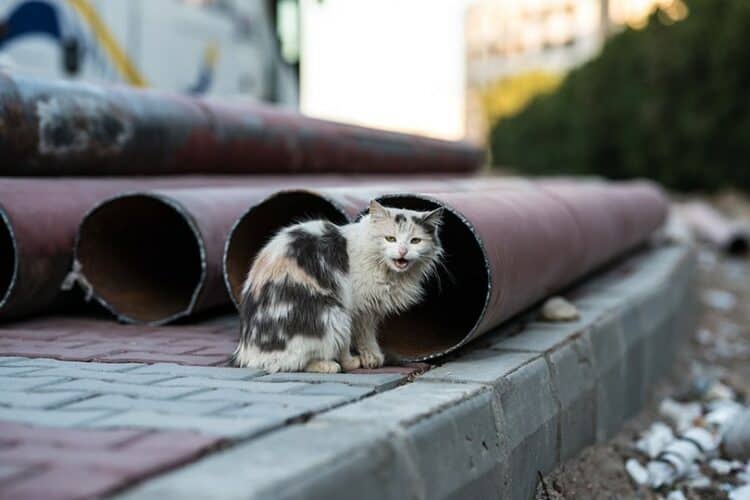Feral cats typically avoid human contact. Most are scared of people, as they have not been well-socialized. Therefore, they usually do not pose a threat to people directly. Feral cat attacks are extremely rare and usually caused by cornered or sick cats—a cat in pain may be unable to escape and will be more likely to attack.
Therefore, feral cats typically won’t bother you as long as you leave them alone.
With that said, there are some indirect consequences of having feral cats around that may be harmful to people. Feral cats can spread diseases to people, though this is extremely rare and usually only occurs through direct contact.
While many people are worried about rabies transmission between feral cats and people, practically all rabies is transmitted to people from wildlife—not feral cats. In fact, only 183 cats tested positive for rabies in 2018 and most of those came from the same geographical area. Despite this, no human transmission was related to these cats.
In fact, only 13% of transmission of rabies from a domestic animal was linked to cats. The rats were from dogs, who are evidently much more likely to spread rabies to people.
Should I Take in a Feral Cat?
Firstly, getting the definition of “feral” and “stray” cats correct is important when you consider taking in an animal. Typically, feral cats are not domesticated and fearful of people. These cats do not let you touch them, and you likely will not see them. Usually, they spend time where humans are not located or come out when humans are not around.
If a cat lets you pet it, it is likely not a feral cat. Feral cats have never been socialized with people and rarely become domesticated. “Catch and release” programs send cats back to where they were originally found after spaying or neutering them for this reason. They are simply not compatible with living in a home.
However, stray cats are different. They were socialized with people at one point and may enjoy the company of people. While they may be skittish, some may like to be petted. Often, these cats will beg for food or follow people around, while feral cats will not.
If you’re considering taking in a cat you found on the street, it is likely a stray. If you’re even asking whether you should take it in or not, the odds are that the cat is at least somewhat domesticated, which means that it is not feral.
Stray cats can make wonderful pets. In all likelihood, the stray cat was actually someone’s pet at some point. Therefore, the cat was likely used to domestic living at some point. It probably won’t be “domesticated” and may even know how to use a litter box.

Do Feral Cats Let You Pet Them?
No. Feral cats typically do not let you pet them. They are not domesticated or used to a human’s touch. They act like wild animals, hiding during the day and avoiding people. They are often likened to raccoons. Raccoons don’t walk up to people and ask to be petted—feral cats don’t either.
Therefore, feral cats will not ask to be petted. They won’t let you get close enough to pet them, and we don’t recommend that you try. These cats are not as docile or comfortable around people as domestic cats.
If a cat lets you pet it, there is a very high chance that it is actually a stray, not a feral cat. It may be a lost cat that once had an owner, a barn cat that wandered too far from the farm, or a cat that was dumped. Either way, many stray cats are domesticated.
Wrapping Up
Stray cats are not particularly dangerous to the local human population. While some feral cats can carry diseases, the transmission of these diseases to people is extremely rare. Usually, these cats stay away from people. They act similarly to wild animals, so the odds of coming into direct contact are rather low. In fact, rabies transmissions from feral cats are extremely rare.
Still, we don’t recommend trying to interact with feral cats. The best option for these cats is to go through a trap-and-release program, which helps limit the number of new kittens born feral. However, feral cats cannot be domesticated after they turn 8 weeks old (and some older kittens are still difficult to socialize).
Featured Image Credit: Pixabay














